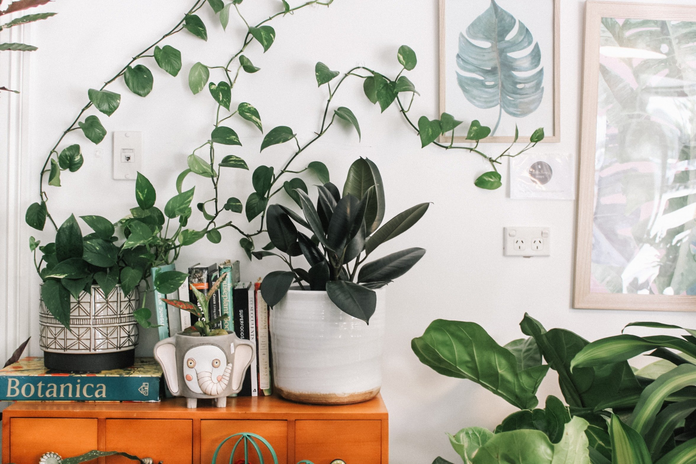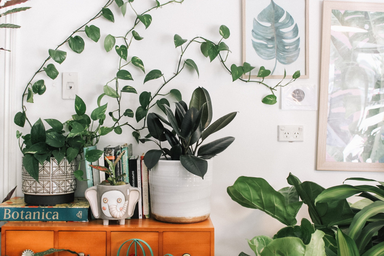Edited by Janani Mahadevan
Do you have a mini-garden on your balcony at home? Or a small field of vegetables in your backyard? Maybe a few succulents in your dorm room? Do you enjoy taking care of them? Do you find pleasure in watching them grow? Do you feel pain when the plants you so dedicatedly and lovingly cared for wither?
I don’t relate.
I’ve never been able to take care of plants. It wasn’t just a matter of incompetence but also of disinterest. Failed science projects to sprout beans and onions within a week serve as a testament to my apathy. In my first year of college, I got myself a plant from the nursery but poor Peraltiago died within a short month and a half. The failure was disheartening but I decided to consider it as a prospect that I shouldn’t attempt anymore lest I accidentally take more lives.
The COVID-19 pandemic brought me home and coming home meant incoming chores. The region I live in weathers temperatures that go as high as 50 degrees over the summer. The natural response to such inhuman conditions would be to avoid the penetrating heat within the four walls of my home. The added imposition of a lockdown further forced me to stay indoors all day. Sunlight became a foreign concept to my skin in the next few weeks.
One trip to the doctor later, and I was introduced to the chore of watering the twenty-something plants in our balcony every day. I had been diagnosed with a Vitamin D deficiency and given a prescription of at least fifteen minutes of sunlight daily. My father jumped at the chance to get me to feed the plants while simultaneously curing my deficiency, imploring that it was too hot for the vulnerable leaves to survive the unapologetic sunlight. Considering my prescription, I agreed, albeit grudgingly.
The next day came. Armed with a water spray bottle and protective slippers, I stepped out onto the balcony. The sun bore down on me. Sweat rolled down my back. I scowled at the drooping plants as I watered each of them. I wasn’t happy with my current predicament and I made no effort to hide it. This, of course, meant that I turned my back on them as soon as I was done and did not look back until the clock struck ten exactly twenty-four hours later.
Days passed by. Watering the plants every day unwillingly compelled me to notice the plethora of changes they underwent, or the lack thereof. Impatience raged; I was frustrated that their leaves still drooped and their flowers still refused to bloom even though I watered them religiously. I wanted to give up but couldn’t. To stave my anger, I started talking to the plants. I half-heartedly threatened to stop watering them if they wouldn’t at least try to survive. I warned that I’d pluck away all their leaves– disclaimer: I had no such intention– if their stems didn’t become stronger, if their leaves didn’t become greener, if they didn’t grow.
Over the weeks, my monologues morphed into wordless humming. Sometimes, if I was in a happy mood, I would even sing to them. I noticed every sprout, every leaf, and every bud. I was sensitive to every slump, every dry spell. I notified my father whenever I saw the slightest discoloration or the most insignificant limp. A sudden realization hit me: I had started to care about these plants. I wanted them to do more than just endure. I wanted them to thrive.
And thrive they did. Shrubs flourished, climbers climbed, creepers crept and buds flowered. The wilting leaves became stronger and greener. The sunlight cast them as emeralds and jades as I fed them parabolical sprays of water. And I grew along with them. Taking care of them gave me purpose, something I desperately needed in order to stabilize the blurry, sluggish days that passed by without notice. Soon, I was watering them not only in the morning but also in the evening– a time after the cruel sun had sucked out every drop of moisture– simply because I liked the way the leaves glowed under my care and attention.
I was clearly enjoying it– my so-called “chore”.
Every plant seemed to have a different personality. Some were like grumpy kids who threw tantrums when they weren’t fed on time. They were the ones who grabbed my attention and emotionally blackmailed me into watering them by appearing yellow and wilted. Some were easily pleased; they only needed a few drops of water to bloom cheerily. Some were loud and vivid and hard to miss– they were the party of the crowd. Their stems extended everywhere, circling other plants but never choking them. All of them were precious and beautiful in their own way.
I could lie and say I learned patience while I took care of those plants. I’d rather not. Here’s the truth: I’m still as impatient. Why would an impatient person who’d rather have immediate gratification take care of plants that take time and effort? It’s because plants don’t lie. They reflect exactly what you give them. You get what you give. They flourish when you care for them. Likewise, they wilt when you ignore them. They’re transparent so they’re bad liars. These bad liars are also incessantly persistent. Being throttled by temperatures as high as 50 degrees does not deter them from blooming into beautiful reds and yellows and whites. They are inspiring, somehow. It is that same awe-inspiring feeling you get when you notice a single flower growing resolutely through the cracks of a cement wall.
I’m no master at taking care of plants now. If I tried growing another plant in my dorm, I’d probably accidentally kill it again. I wouldn’t ever grow a bunch of plants on my balcony if I lived alone either. Not even a low-effort indoor plant.
What’s the takeaway then?
Nothing. Sometimes, you do something simply for the moment. Not everything you do in the present has to be an investment for the future. Something you enjoy doing now doesn’t necessarily have to be a permanent change you incorporate into your life. For me, taking care of those plants was something I needed to do, something that stabilized me during the uncertainty of the ongoing pandemic. There is no pressure to like something forever and stay true to it. Those feelings of satisfaction may be temporary and be prone to fading away as time passes. You may even start to dislike it once again. These changes are constant. And that’s okay.



